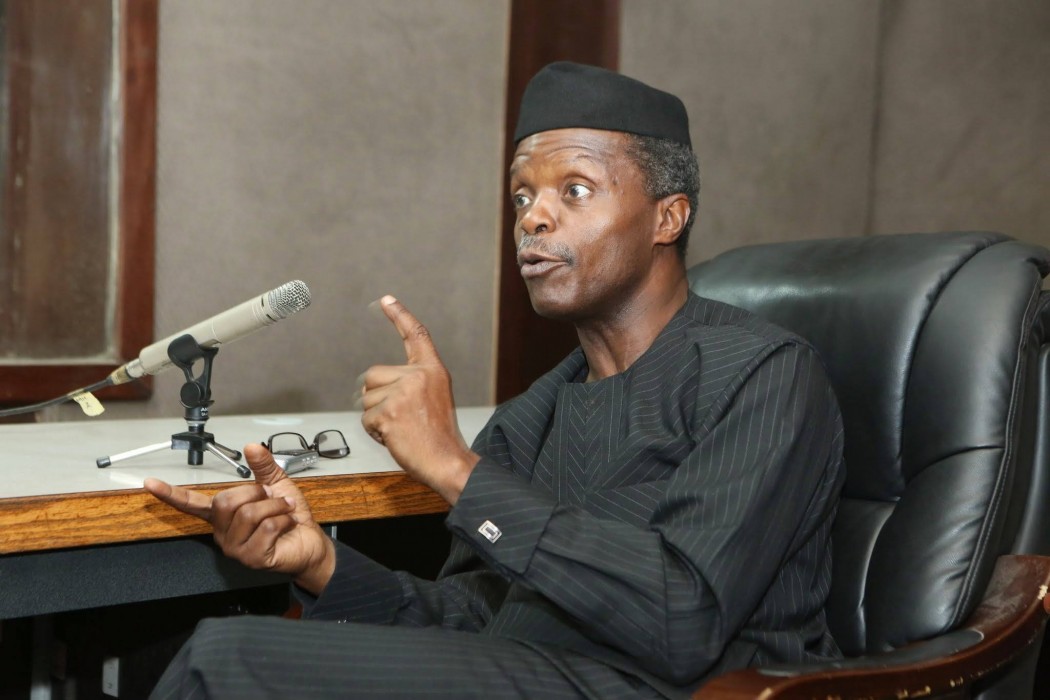Vice President Yemi Osinbajo says Nigerians are willing to pay for electricity if the services they receive from the distribution companies are constant and better.
Osinbajo expressed this view while featuring in a webinar on “Economic Sustainability Beyond COVID-19” organised by Emmanuel Chapel on Sunday, June 21, 2020, in Abuja.
The Vice President said it was not true that Nigerians did not want to pay more for power, adding that they had been unhappy with the poor service over the years.
Osinbajo reacted to a question posed by the former Emir of Kano, Muhammad Sanusi II.
“Just to comment on the point you made and I have alluded to it that income elasticity is more important for persons living in the rural area and for the poor who need to have electricity for whatever means of livelihood they have.
“What we have discovered especially as we have worked with private sector to deploy solar power in different parts of the country is exactly the point you have made.
“For example, in Wuna, a village which is just outside Abuja, they never had light until a private company provided solar power there.
“What they pay on average for their power is well in excess of the N37 per unit that we pay for power off the grid.
“Turankawa in Sokoto pays almost N100. So, from many of the areas where we have been it is evident that this business of people not willing to pay for power is not true at all.
“As a matter of fact the reason there is such great resistance is really the service level.
“Most people are used to poor service so they just see every tariff increase as injustice because they are getting poor service but are asked to pay more.
“But where service is guaranteed people have been prepared to pay.’’
He listed Sabon Gari market in Kano, Ariaria market (in Aba) and in the Sura market (in Lagos) and so many different parts of the country as instances where people paid for better services.
According to him, the question really is one of service as there must be a way of guaranteeing service in exchange for tariff increase which is really the point being made with the DisCos.
He said that the needful should be done in power sector as the market failure in the power sector was mostly due to how the privatization was done.
Osinbajo noted that the market had become problematic due to not allowing market forces to determine the price.
“We need to get to the market-based system in which the NERC would only serve as a regulator and not a determinant of the cost price of power.
“In March, the DisCos were mandated to go to the customers and negotiate based on service, this will help remove the subsidy regime that the government is bearing.
“The entire grid currently leaves out about 60 million persons who do not have power.
“This is one of the reasons the Economic Sustainability Plan has adopted renewable energy for rural people by encouraging the private sector to install microgrids.
“It has already been done in Sabon Gari and Ariaria markets where power is paid for by store owners.
“In these two markets, the people are willing to even pay higher for the better services they are receiving.
“We have a target of 25 million homes for the microgrid across the country,’’ he added.
Asked by the moderator, Konyin Ajayi, why the country was not spending more on health as the revised health budget showed a marked reduction, Osinbajo said the budgetary allocation of health in 2020 was high.
“The 2020 health budget has recorded the highest budgetary allocation to the health sector over the last five years.
“In 2018, N356 billion was allocated to healthcare out of the total budget of N9.1 trillion; In 2019, the figure was N372 billion out of the total expenditure of N8.91 trillion.
“This is a 13.3 percent increase of N372 billion that was budgeted in 2019,” he said.
Other discussants at the webinar were Ngozi Okonjo-Iweala, the chairperson, GAVI, the Vaccine Alliance, Donald Kaberuka, former AfDB President while Chinny Ogunro moderated the conversation alongside Ajayi.
Source: The Sun Nigeria







